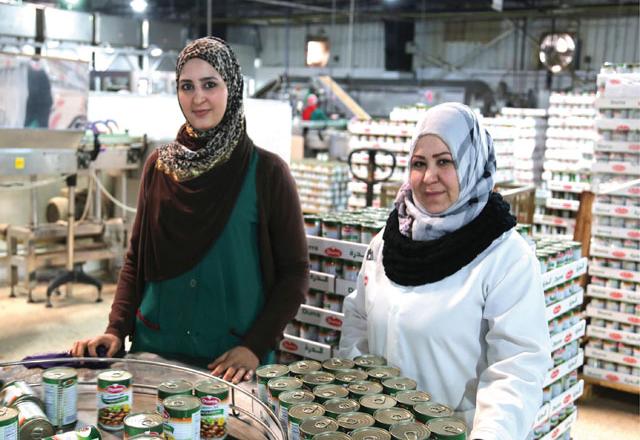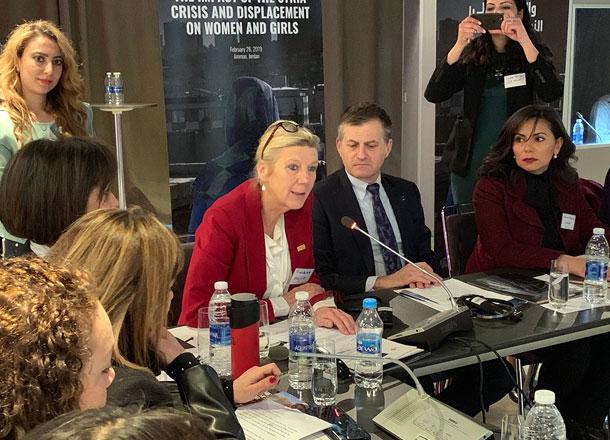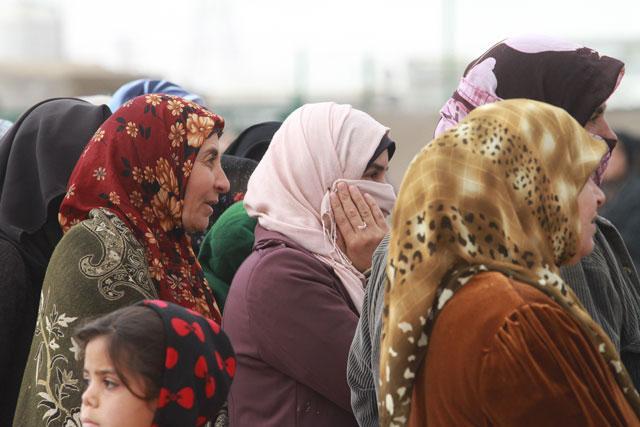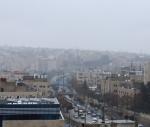You are here
Majority of unemployed women want to work — study
By Rana Husseini - Mar 12,2017 - Last updated at Mar 12,2017

External obstacles are contributing to the gender gap in the Jordanian labour market, rather than women’s individual attitudes, a UN study finds (Photo courtesy of Bea Arscott/ DFID)
AMMAN — A UN study on Jordanian and Syrian refugee women published on Sunday indicated that almost half of those who are unemployed would work if they had the opportunity.
The study’s findings were presented at the launch of the report “Women Working: Jordanian and Syrian Refugee Women’s Labour Force Participation and Attitudes Towards Employment (2016)”.
The study indicated that 57 per cent of those not currently in employment want to work if they had the opportunity, with economic reasons and a desire for greater independence and self-confidence the primary motivations.
The findings suggest that external obstacles are contributing to the gender gap in the Jordanian labour market, rather than women’s individual attitudes.
On the other hand, 37 per cent of women reported they would not want to work even if given the opportunity, instead preferring to stay at home and care for children and undertake household responsibilities.
The event, held at the Landmark Hotel as part of this year’s celebrations of International Women’s Day, embraced the global theme of “Women in the Changing World of Work: Planet 50:50 by 2030”.
The study also revealed that only 19 per cent of Jordanian women surveyed are employed, with 81 per cent not working.
The report also touched on some of the societal and structural obstacles facing both Jordanian and Syrian refugee women, such as cultural and religious pressures and finding jobs that match women’s qualifications.
The study also indicated that only two per cent of Syrian refugee women have work permits.
“Women either lack information or think it is not worth their time to apply for a work permit, although it is a legal requirement to work in the country,” the report said.
The study was carried out through a nationwide telephone survey of 306 with Jordanian women and 303 Syrian refugee women, all over the age of 18, as well as 12 focus group discussions.
The survey was designed to measure the prevalence of employment indicators, including women’s current employment status, employment sectors, reasons for economic inactivity or unemployment, perceptions of availability of and obstacles to women’s employment, as well as preferences for employment inside or outside the home.
UN Women Country Office Representative Ziad Sheikh said that the “most significant findings of the study presented today is that most women [both Syrian and Jordanian] who are currently not employed would want to work, if they had the opportunity.”
Jordanian women, especially young women, Sheikh added, face several socio-cultural and structural challenges entering the labour market, yet they want to work.
Meanwhile, she said that Syrian refugee women almost exclusively rely on their friendship or family networks to find employment, which consistently limit their opportunities compared with their male counterparts.
Increasing efforts should be focused on reaching out to these women and informing them about the availability of sustainable livelihood opportunities — inside or outside the house — while also raising their awareness on their rights when entering the Jordanian labour market, according to Sheikh.
The launch event aimed to introduce the key findings of the research to humanitarian and development actors in Jordan, including the UN agencies and NGOs. The event also included group discussions — organised according to the main research themes — to discuss the key findings and to reach actionable, context-specific recommendations to promote women’s economic empowerment in Jordan.
Bothaina Qamar, livelihoods specialist at UN Women, said the purpose of the event and group discussions among agencies was to “have operational recommendations and to hear people in the field, and on the policy and programme level”.
“We want to explore what could be done and how things can be improved for both Jordanians and Syrian refugee women, because now there is a lot of focus towards engaging also Syrian women in the labour market with Jordan’s commitment under the Jordan Compact,” Qamar told The Jordan Times.
The goal of the workshop, she explained, was to produce a document that would be distributed publicly, instead of only “discussing it among UN women, and to reach conclusions from their own perspectives”.
“We want to trigger players in the field to enhance their programming by listening to other people’s experiences and reflect on the study’s findings,” Qamar added.
The study was carried out by UN Women and the REACH Initiative with support from the Japanese government.
The Jordan Compact is part of the international community’s response to the ongoing Syrian crisis.
It aims to support the resilience and welfare of both Syrian refugees and Jordanian hosts, promising legal access to livelihoods for Syrian refugees and expanding employment opportunities for both Syrian refugees and Jordanian host communities.
Related Articles
AMMAN — The international community, the Jordanian government and local organisations on Tuesday delivered their message to the third Brusse
AMMAN — Elevate Social Businesses (“Elevate”), in partnership with the King Abdullah II Fund for Development (KAFD), has announced its suppo
AMMAN — Underlying the important contribution of Syrian women to economic development in Jordan, Tamkeen for Legal Aid and Human Rights has



















